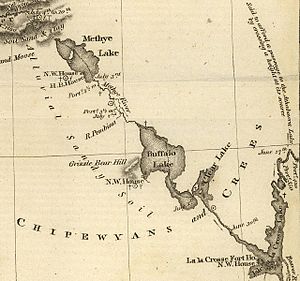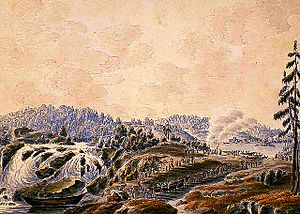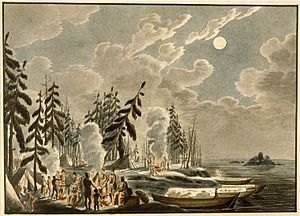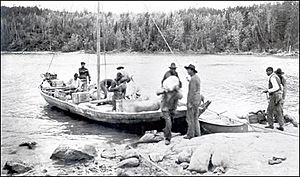Portage La Loche Brigade facts for kids

The Portage La Loche Brigade was a special group of York boats that traveled long distances in Rupert's Land. These boats were part of the Hudson's Bay Company's transportation system during the North American fur trade.
Every year, this famous brigade traveled about 4000 miles. Their journey from Fort Garry to Methye Portage (also called Portage La Loche) usually started around June 1st and ended by October 8th. Only one other brigade, the York Factory Express, had a longer route. That brigade traveled 4200 miles until 1846.
By the 1820s, the Hudson's Bay Company had several York boat brigades. Each brigade traveled its own route. Trading posts were built along these routes. When the ice melted, the brigades would carry trade goods and food to these posts. They would also pick up all the furs collected during the winter. They even carried mail and passengers!
Most of the boat crews were Métis people. In fact, many men working for the Hudson's Bay Company's Northern Department were Métis. In 1862, a priest named Father Émile Petitot wrote about this. He quoted William J. Christie, a chief factor at Fort Edmonton, who said, "We are almost all Métis in the Company."
History of the Brigade
The first Portage La Loche Brigade started in 1826. It was made up of men from the Red River Colony. This first brigade had seven York boats, led by a guide named Laurent Cadotte.
Later, in 1833, Alexis L'Esperance (also known as Alexis Bonami) became the guide. He worked until 1866. By 1848, the Hudson's Bay Company had two Portage La Loche Brigades. Each had seven boats and its own guide. One was still led by Alexis L'Esperance, and the other by Jean Baptiste Bruce.
In 1866, the company increased the number of Portage La Loche Brigades to three, with a total of seventeen boats. The very last Portage La Loche Brigade arrived at Norway House in 1873.
Life on the Boats
Father Emile Petitot wrote about his trip with the Portage La Loche Brigade in 1862. He left Fort Garry on June 8th as a passenger. He arrived at the portage 42 days later, on July 20th.
Petitot described the journey: "The distance from Fort Garry to Portage La Loche was about 1446 miles. We traveled in a small vessel called a York boat."
York boats were flat-bottomed and pointed at both ends. They could carry 4 to 5 tons of goods. Their keel (bottom part) was usually 30 to 36 feet long. They were moved by rowing or sailing and steered with a long oar or a rudder.
A York boat crew had nine to ten men. This included a helmsman (who steered), a bossman, and eight rowers. The rowers were also the porters, meaning they carried goods over land.
Petitot's guide was an old French Canadian named Alexis Lesperance. Even at 80 years old, he was full of energy. His boat was always first, guided by his son. The crew of Petitot's boat included Métis, Swampy Cree, and Ojibwe Christians.
When it was time to leave, the guide would shout, "Aoh! Aoh! Pousse au large!" (Push out!). The crews would answer with a loud "Wi! Wi!" Then, the seven York boats would set off on the Red River of the North.
Father Petitot bought many supplies for his journey. These included flour, sea biscuits, pemmican, hams, bread, buffalo tongues, smoked meat, eggs, onions, tea, maple syrup, sugar, coffee, salt, pepper, and butter. He also had blankets, a hatchet, and clothes.
Another traveler, Father Émile Grouard, also wrote about his experience. He said that Monsignor Taché arranged their trip with the Hudson's Bay Company. They left on a special day called Pentecost.
Grouard described their supplies: "We each had our travel case. Monsignor Taché provided thick wool blankets, a tent, a stove, a tea kettle, plates, pans, knives, forks, dried meat, a large sack of pemmican, biscuits, ham, tea, and sugar. This was meant to last us for two months."
He added, "Monsignor also arranged for a Métis to cook for us. This person would help us set up and take down our tent every day. He told us to quickly obey the guide's signal: "Lève! Lève!" (Get up!) in the morning."
Route of the Brigade
The Portage La Loche Brigade followed a long and challenging route. Here's a general timeline of their journey:
| 1 June | The brigade started from Fort Garry. They went down the Red River of the North and crossed Lake Winnipeg. |
| 10 June | They reached Norway House. Here, they picked up supplies that had been stored from York Factory the year before. |
| 12 June | They left Norway House, crossed Lake Winnipeg again, and entered the Saskatchewan River system at Grand Rapids. |
| 24 June | They passed Cumberland House. Then, they entered the Churchill River system by crossing the Frog Portage via the Sturgeon-Weir River. |
| 9 July | They passed Île-à-la-Crosse. |
| 17 July | They arrived at Portage La Loche. Here, they unloaded their supplies and carried them over land (portaged). They then loaded furs brought by other brigades from the Athabasca River and Mackenzie River areas. |
| 1 August | They left Portage La Loche (Methye Portage) to begin their return journey. |
| 5 August | They passed Île-à-la-Crosse again. |
| 15 August | They passed Cumberland House. |
| 21 August | They arrived back at Norway House. From there, they continued to York Factory using the Oxford House and Hayes River route. |
| 31 August | They reached York Factory. They unloaded the furs and loaded new supplies for Norway House and Fort Garry. |
| 10 September | They left York Factory. |
| 30 September | They returned to Norway House. Supplies were unloaded here to be picked up the next year. |
| 8 October | Finally, they arrived back at Fort Garry with supplies and mail. |
Images for kids
-
John Franklin's 1819-1822 expedition map showing the Churchill River fur trade route from Frog Portage to Lac Île-à-la-Crosse.
-
John Franklin's 1819-1822 expedition map showing the Lake Winnipeg and Saskatchewan River part of the fur trade route from Norway House to Grand Rapids to Cumberland House.
 | James Van Der Zee |
 | Alma Thomas |
 | Ellis Wilson |
 | Margaret Taylor-Burroughs |





